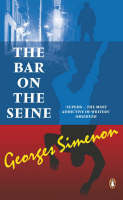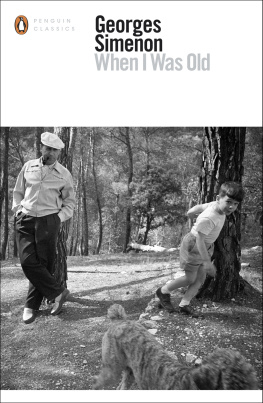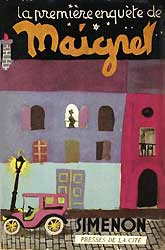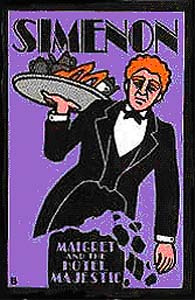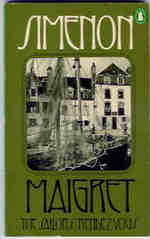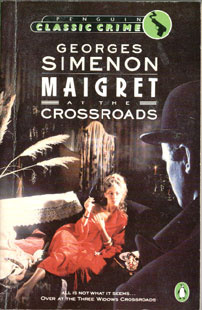TROPIC MOON
GEORGES SIMENON
Translated from the French by
MARC ROMANO
Introduction by
NORMAN RUSH
NEW YORK REVIEW BOOKS
NEW YORK REVIEW BOOKS
CLASSICS
TROPIC MOON
GEORGES SIMENON (1903-1989) was born in Liege, Belgium. His father was an insurance salesman, easygoing and unambitious; his mother, an unhappy, angry woman whose coldness and disapproval haunted her son. Simenon went to work as a reporter at the age of fifteen and in 1923 moved to Paris, where under various pseudonyms he became a highly successful and prolific author of pulp fiction while leading a dazzling social life in the company of his first wife and lovers such as the American dancer Josephine Baker. (He is said to have broken up with Baker because their affair was a distraction: he had produced a mere twelve novels during the year.) In the early 1930s, Simenon emerged as a writer under his own name, gaining renown for his detective stories featuring Inspector Maigret. He also began to write his psychological novels, or romans dur books in which he displays his remarkable talent for capturing the look and mood of a place (whether West Africa, the Soviet Union, New York City, or provincial France) together with an acutely sympathetic awareness of the emotional and spiritual pain underlying the routines of daily life. Simenon remained in France throughout the Second World War, at the end of which he was accused of collaboration with the Germans; though quickly cleared of the charges, he moved to America, where he married his second wife and lived for close to a decade, returning to Europe in 1955. Having written nearly two
hundred books under his own name and become the best-selling author in the world, whose stories had served as the inspiration for countless movies and TV shows, Simenon retired as a novelist in 1973, devoting himself instead to dictating memoirs that filled thousands of pages: "I consider myself less and less a writer ... All this is nothing but chatter ... Since dictating has become a need, so to speak, I will dictate every morning whatever comes into mind ... I would like to be able to be silent."
NORMAN RUSH is the author of Whites, Mating, and Mortals.

New York
THIS IS A NEW YORK REVIEW BOOK
PUBLISHED BY THE NEW YORK REVIEW OF BOOKS
1755 Broadway, New York, NY 10019
www.nyrb.com
Copyright 1933 by Georges Simenon Limited, a Chorion company Introduction copyright 2005 by Norman Rush All rights reserved.
Simenon, Georges, 1903-[Coup de lune. English]
Tropic moon / by Georges Simenon ; introduction by Norman Rush ; translated by Marc Romano.
p. cm. (New York Review Books classics) ISBN 1-59017-111-X (alk. paper) I. Romano, Marc. II. Title. III. Series. PQ2637.153c.613 2005 843'.912dc22
2005006143
ISBN 978-1-59017-in-o
Printed in the United States of America on acid-free paper. 1098765432
CONTENTS
INTRODUCTION
TROPIC MOON (Le Coup de lune) is the first of Georges Simenon's novels to be set outside Europe, and it is also among the first and best of his serious novels, those he called romans durs in order to distinguish them from the hundreds of genre fictions he produced, the romans populaires that were making him rich and world famous, which included his psychological crime thrillers and the titles in the Inspector Maigret series. It is a remarkable work, in which Simenon's characters deliver a brutal and clueless enactment of interwar French imperialism at its most nakedin Gabon, French West Africa, in the capital Libreville and upcountry. As a revelation of the institutionalized squalor the French Empire amounted to, it stands high, ranking with L. F. Celine's depiction of life in another part of the same empire, Cameroon, in his Journey to the End of the Night.
It's a particularity of the iconography in porn magazines that the male partners of the lovingly detailed women on display will often enough be represented essentially as mere functioning lower selves, torsos, their heads cut off by the edges of the layouts. Something similar is seen in the character embodiments in this moral tale: the actors are reduced to their appetites. The face of Adele, the hyperpromiscuous antiheroine of the novel, is never described. We do learn about her that she wears clinging dresses and disdains underwear. She is in her thirties. Her breasts droop, slightly. Similarly, the African locale is rendered rather generically. We have the Hotel, the Prefecture, the Docks, the Police Station, all evoked without recourse to the kind of detail that might distract from the vertiginous drama of personal destruction we have come to witness. Simenon's heightened minimalism serves his purposes well, forwarding the staccato unfolding of the central plot. Maddening heat, isolation, boredom, illness, alcoholthe traditional scourges of white expatriates in tropical Africaplay their expected parts in sustaining the lethal malaise that hangs over Libreville.
Joseph Timar, a young man from the provinces (La Rochelle), arrives in Libreville in the early 1930s intending to take up a posting at a timber camp in the jungle. His well-placed family in France has arranged this opportunity for him. He is an innocent. Obstacles arise that prevent him from going directly upriver and he falls into a sexual relationship, not an affair exactly, with the wife of the owner of the hotel he is lodging in. This is Adele, and she has been active with a great many of the French gentlemen around town. Billiards, Pernod, card games, out-of-date newspapers, and intermittent sex with Adele occupy Timar's time. When the mood seizes them, male members of the French community organize orgies in the bush with native women, abandoning them there without transportation at the end of the one excursion Timar goes along on. At this stage, the story has only begun. To come are rape, corrupt legal proceedings, other varieties of chicanery, more death, more spectacles of injustice.
We can't help but read this novel today against our knowledge that in 1932 European civilization is poised, one more time, to give birth to monstrous fratricide, genocide, apocalyptic warfare, cultural destruction, the breaking of nations. In Tropic Moon the dehumanizing heedlessness, rapacity, and cruelty shown by the agents of the French mission civilatrice toward the black populations under their control will, we know, be replicated, played out differently very soon elsewhere, by different Europeans, different actors, with different victims. And beyond the looming specter of fascisma subject, by the way, not on the minds of any of the characters in this bookis something else we know is coming. And that something else is the bleak outcome for black Africa of the inevitable arrival of independence, a process itself hastened by the autodestruction of European power. The reader is barred from the easy comfort of feeling that the poverty and cruelty of colonial life described in Simenon's novel will be, will have been, undone by decolonization. Conditions in West Africa today are dauntingly, if variably, grim. But how could it be otherwise? The scene presented by Simenonthe stripping of natural resources by French commercial interests, the instruction in unfairness provided by the colonial system of justice, the reduction of the African population to servile statusis portentous. There are portents in Tropic Moon. Its original readers may not have seen them, but we do.
In the matter of justice, Simenon's novelsthe romans durs and the psychological crime studiesdispense with it. It is not to be had, generally speaking. So Tropic Moon can be taken as one more specimen from a dense array of similarly Hobbesian Simenon stories set anywhere, including the United States, Europe, ships at sea, in which crimes (typically crimes of passion or impulse) are committed,
Next page



